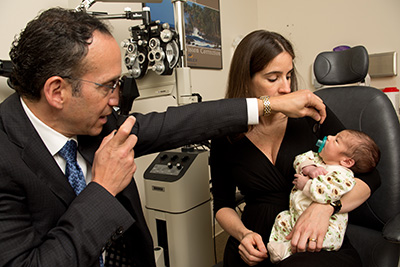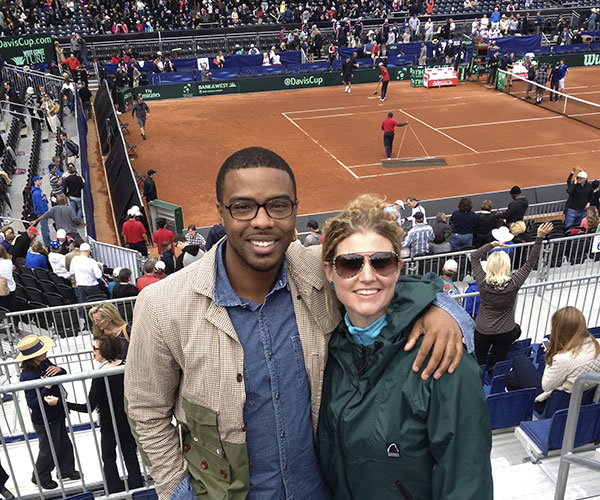The UCSD Division of Pediatric Ophthalmology believes in fostering the clinical, surgical and research education of ophthalmologists throughout the world. To this end, we offer an International Fellowship in Pediatric Ophthalmology and Adult Strabismus. Our fellowship prepares graduates for careers in academic or cutting edge private pediatric ophthalmology and strabismus medicine.
Fellows divide their time between research and the busy clinical and surgical practices of Dr. David Granet Professor / Director (co-Founder of the World Society of Pediatric Ophthalmology and Strabismus) and Dr. Shira Robbins, Associate Professor. International Fellows become integral members of the UCSD PedOphth Team.


The mission of the UC San Diego Ratner Children’s Eye Center Pediatric Ophthalmology fellowship is to train American and International Ophthalmologists to be outstanding Pediatric Ophthalmologists & Adult Strabismologists who excel clinically, surgically, ethically and morally. Our fellows will participate in research which positively impacts the field and develop an appreciation for the importance of global teaching and learning.
Previous fellows have returned to their respective institutions and have taken up prestigious positions in their countries. We have trained fellows from India, The Philippines, Brazil, and China, to name just a few.
Director: David B. Granet, MD, FAAO, FAAP, FACS Curriculum Vitae
Fellowship Preceptor: Shira L Robbins, MD, FAAO, FAAP Curriculum Vitae
Fellowship Coordinator: Amy Le
The fellow will spend the majority of time at UCSD with Dr. Kikkawa and Dr. Korn. All preceptors are committed to teaching and providing the fellow with the best learning experience possible.Director: David B. Granet, M.D., FAAO, FAAP, FACS

The mission of the UC San Diego Ratner Children’s Eye Center Pediatric Ophthalmology fellowship is to train American and International Ophthalmologists to be outstanding Pediatric Ophthalmologists & Adult Strabismologists who excel clinically, surgically, ethically and morally. Our fellows will participate in research which positively impacts the field and develop an appreciation for the importance of global teaching and learning.
Previous fellows have returned to their respective institutions and have taken up prestigious positions in their countries. We have trained fellows from India, The Philippines, Brazil, and China, to name just a few.
Successful completion of at least three years of postgraduate basic residency requirements. Applicants must be either board-eligible, board-certified, or the equivalent in the person's basic discipline.
Applicant must provide evidence of legal entry into the United States, typically a UCSD sponsored J-1 type Visa.
UCSD J1 VisaApplicant must obtain permission from the California Medical Board to participate in clinical activities through its Section 2111 program.
2111 ProgramNOTE: For those that cannot qualify under the above criteria other research fellowships that include clinical contact are available. Please contact us for more information.
In addition to clinical and surgical experiences, all fellows are expected to participate in clinical or basic science research and to present findings at local, regional or national meetings.
Collaboration with other members of the Department of Ophthalmology faculty can be arranged for projects of mutual interest. Excellent statistical support and other research services are available.
Presentations at important meetings (some around the world) are typical.
Fellows are also expected to participate in teaching activities in the Department of Ophthalmology.
The Division of Pediatric Ophthalmology and Strabismus has twice weekly clinical conferences, six annual journal clubs, fifteen formal resident teaching sessions annually and Departmental Grand Rounds presentations throughout the year.
Continuing Medical Education, Grand Rounds, Research Day

In addition fellows will gain deeper exposure to the pediatric ophthalmology subspecialties through the many Shiley Eye Institute faculty with pediatrics expertise.
Once the Section 2111 appointment is approved, guest physicians may have clinical contact with patients but are closely supervised. The appointment enables the international fellow to participate in the evaluation and management of patients in the clinic and operating room.

Kweku Grant-Acquah, M.D. '13-14 with fellowship preceptor Shira Robbins, MD at the Davis Cup tennis championship 2014.

Interested applicants may forward questions by email to:
Amy Le, the fellowship coordinator.
Information about diversity and inclusion is available through multiple venues. First, there are several websites available that provide information about diversity initiatives across the entire campus (diversity.ucsd.edu) and the (School of Medicine). Many departments have their own websites as well. Virtually all departments at UCSD have identified an Equity, Diversity, and Inclusion (EDI) ambassador, typically a faculty member who spearheads diversity-related initiatives in their areas/specialties and also collaborates with various entities across the medical school.
There are several active affinity organizations for UCSD medical students. These include:
The Association of Native American Medical Students (ANAMS)
The Asian Pacific American Medical Students Association (APAMSA)LGBTQ
Pharmacy and Medical Students (LGBTQ-PhaM)
The Latino Medical Student Association (LMSA)
Medical Students for Justice (MS4J)
The Student National Medical Association (SNMA)
UCSD also offers a curricular pathway called Program in Medical Education – Health Equity (PRIME - HEq), which part of a system-wide effort at the University of California to train physicians better able to meet the needs of the diverse Californian population who are traditionally underserved by the medical system. PRIME-HEq faculty work with students to identify populations or communities at risk for health disparities. Students will then receive exposure, training, and the opportunity to work with the identified group to further their passion in the area and provide knowledge and skills to better equip the students to improve health equity for the group.